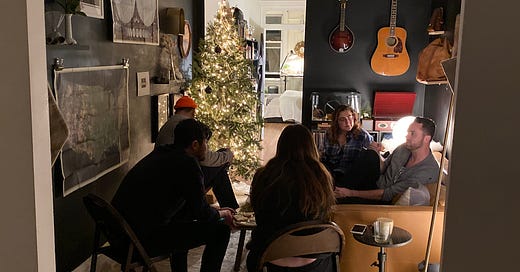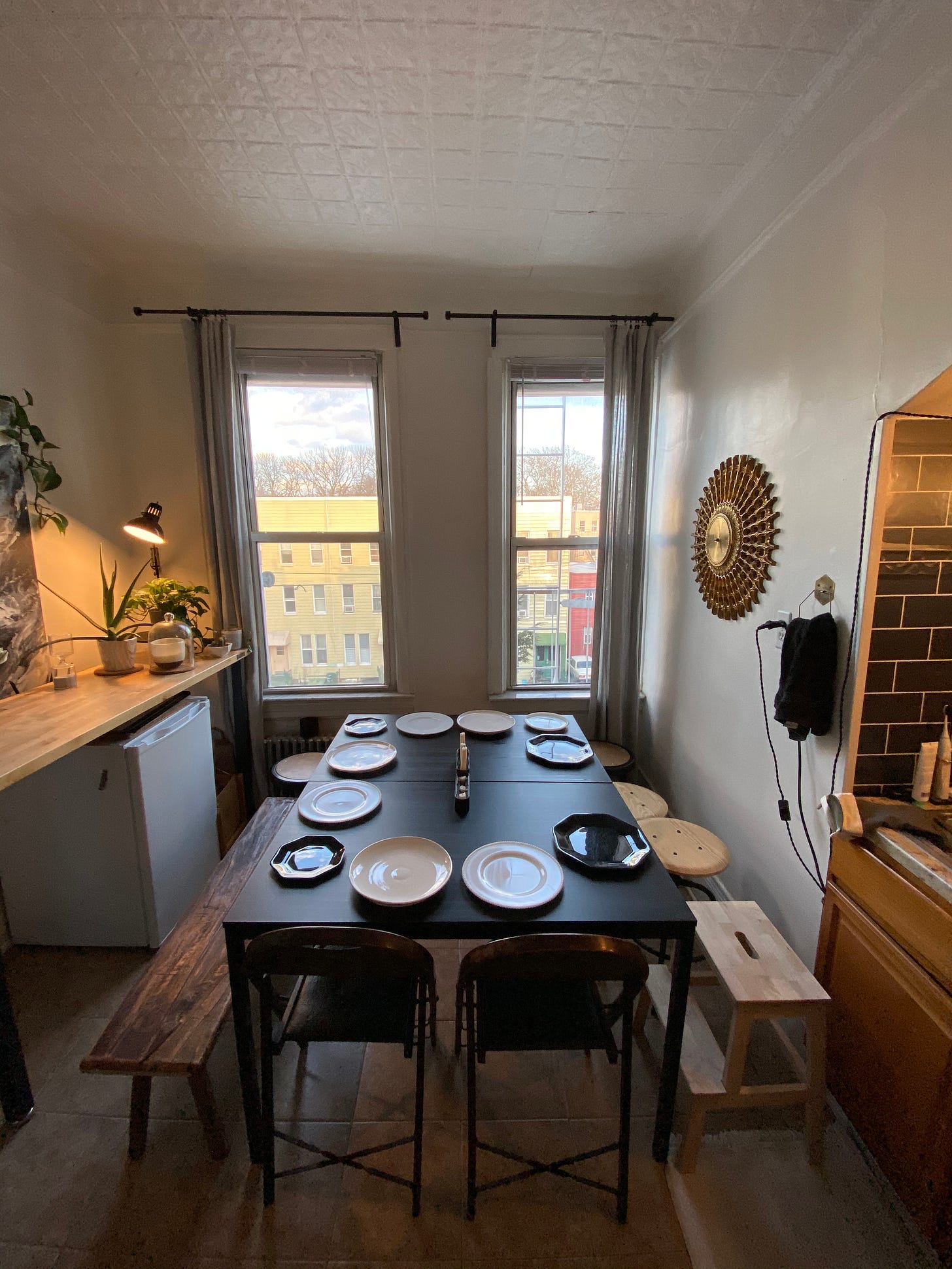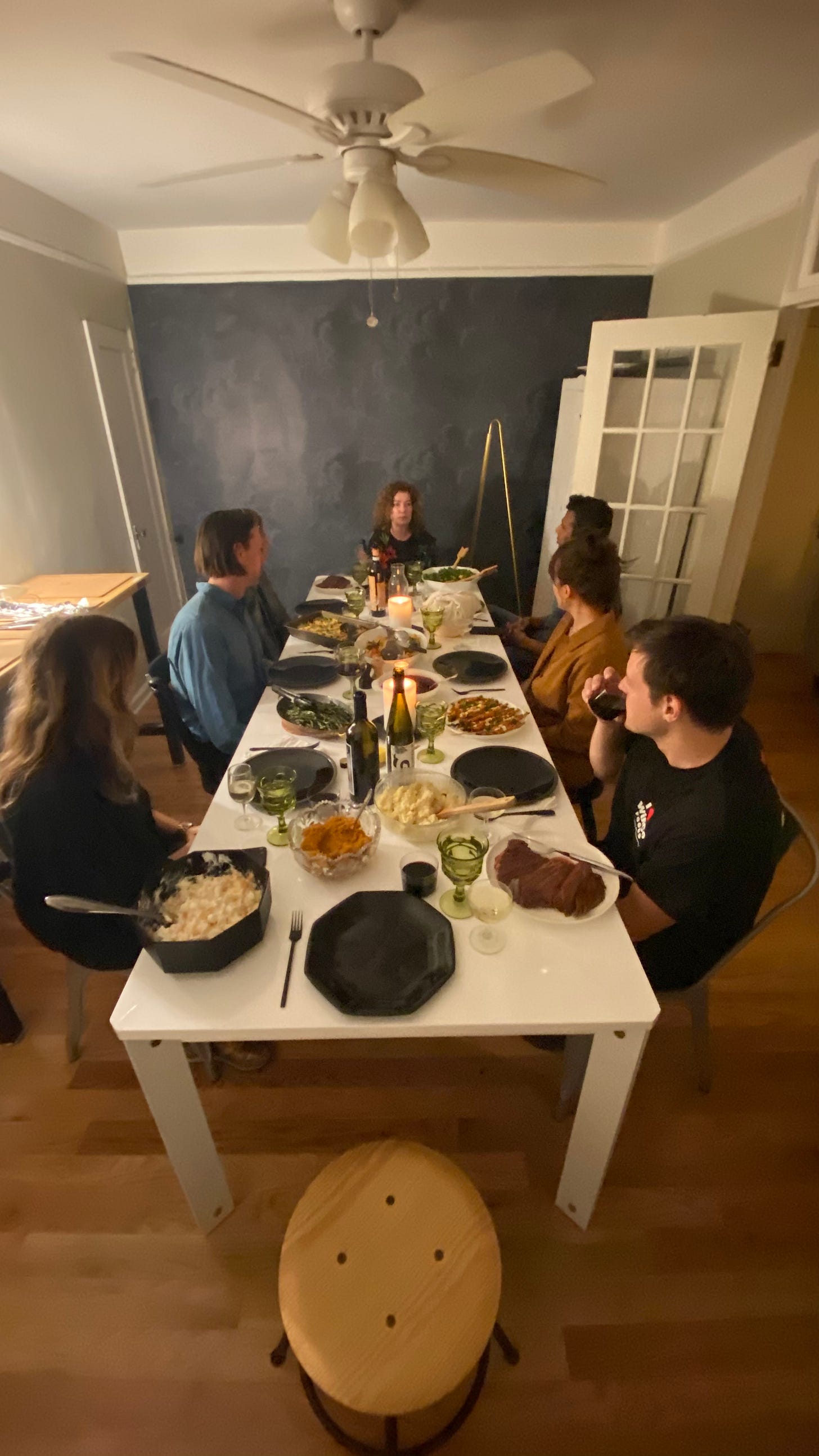Over the years I have quite literally hosted hundreds of people in my home(s). Once I tallied up the RSVPs and had over 400 in a calendar year. From creating the menu, to the setting of the table with flowers and candles, to cooking and baking - I love it all. But really, a well appointed table or delicious meal without people bringing it to life is just a canvas of possibility.
Dinner parties are my favorite to curate but I’m no stranger to a variety of soiree arranging. When I was catching up with a long-lost (ten years) friend in Minnesota this week she asked me if I’ve ever written anything on hosting. I remarked I hadn’t, and that I usually just recommend people read The Art of Gathering by Priya Parker. She pointed out some of the downfalls of that book and after our discussion I was inspired to share my adapted philosophy on hosting and the practical lessons I’ve learned along the way.
As the host you’re the one in charge to protect the gathering and lead and guide everyone
People feel loved and cared for when they see a set table with a place for them
You get to make people feel comfortable and valued
Know the purpose of why you’re gathering people, even if it is as simple as a venue to discuss poetry or a group of neighbors to get to know each other better
Make warm introductions to people who don’t know each other - you have the privilege of knowing the most people and you can easily make connections for people as they arrive
There’s an incredible book called The Gospel Comes with a House Key by Rosaria Butterfield. If I could sum up my personal Venn diagram on hosting inspiration it would largely be the intersection of these two books. Practicing the Way by John Mark Comer also provides some great practical insight on WHY hosting is important. These two books highlight radical local hospitality and are a great reminder that sharing a meal with people is a basic human relational vector and an amazing opportunity to love those around you.
When I was returning to full-time living in New York City after eighteen months splitting time between Los Angeles and NYC I remember hearing quite clearly from the Lord that I was to host a weekly dinner party - and invite everyone. I prayed for a space adequate to accommodate 12 or so for seated for dinners and lo and behold I ended up with a gem of a rent controlled 2 bedroom to myself in Greenpoint, Brooklyn.
Here’s a mid-progress shot of setting the table - as you can see, IT WAS QUITE A COZY SPACE.
For those of you who are familiar with New York City - Greenpoint is not the most accessible neighborhood by public transit. There are parts of Brooklyn that the subway routes you to through Manhattan and then return you to Brooklyn. I bring this up because I think it’s important to note that I was not living in a very convenient neighborhood for many. Nearly every week there were people in attendance from the Upper West Side which while under an hour of a journey involves three different train lines. If your excuse is that you don’t live in a convenient place - I’d argue that’s just cope.
So with the venue (my apartment) secured I then felt an overwhelming array of options to dial in the time/day/duration/format/method of inviting etc. My biggest hurdle was mentally accepting that there was a very real chance that no one would come. Living in a city provides a pretty standard busy schedule for most. There are always things going on and work often goes late or something comes up and while not as bad of a “flaking” city as Los Angeles, it’s not always easy to convince people to commit and follow-through. I’m going to share my “playbook” and the things I learned from running a standing weekly dinner party for years.
Some of these were ways it was less of a mental tax on me during the work week. The real issue I found I had to work through was whether or not people were going to come. I made my peace that the worst case was that I got to enjoy a wonderful dinner I cooked and I’d have leftovers for the week. Basically meal prepping as a consolation prize. If I was eating dinner alone on a Friday night in my home it didn’t mean I was a loser or no one liked me. I got to listen to the records I wanted to and would have way less dishes and clean up. For the record - that never actually happened.
There was at least one dinner that fell the day after Thanksgiving and only one friend showed up and it was actually one of the most lovely chill evenings where instead of being at a restaurant out somewhere, we were together in the cozy comfort of my home and had a splendid time. My advice - take the sting out of the worst case scenario. Maybe your reticence to host is rooted in another fear or insecurity, I encourage you to explore the truth of what it would be like if that really happened. As the host I’ve found that your stress level seeps out. So the more you can just enjoy the people and be present the better time had by all.
I had a set time and place. Every Friday at 7pm. I’d send out an email the Wednesday prior with a Google forms link for people to RSVP and include any dietary restrictions (this was one of the concessions I made along the way as I didn’t want the food to be a barrier to people coming).
Set structure. I tried to keep close to time as outlined. There is a provided window for arrivals - and then meal is served at X time. In my RSVP I allowed a section for notes in case someone was going to be running late/early or wanted to bring a friend etc.
The way the email list got expanded was a bit of a benevolent dictator situation. I could invite people and add them - but no one else could. They could bring a friend and if the friend was a welcome addition I would get their email if they were interested. The reason for this being as I sent the weekly RSVP email out to the whole list every Wednesday. Once you were on - you were in. Way less work for me if there was a bit of a vetting process up front.
In my RSVP email I shared the meal I would be making - and the question for discussion. I was letting people know exactly what to expect. That way they could more specifically share dietary restrictions and also mentally prepare for the evening. (Like this:)
MENU:
I'll be making roasted butternut squash and sage browned butter pasta with some roasted veggies. I'll keep the pancetta apart from the pasta for the vegetarians out there but raise your hand (on your RSVP) if you're vegan so I can make an olive oil version. I'll have GF noodles as well.
I loved when friends brought friends and I don’t think there was ever an instance of it not going well. Even if they didn’t know the question in advance - or a single other person at the dinner other than the friend who brought them - most often they shared! Many times the friend who brought them would tell me they’d learned something they’d never known or were surprised their friend opened up.
To continue to protect the quality of the evening I enacted a cap on RSVPs (due Thursday by 5pm).
Due to the amount of incredible people attending The Weekly I’ll be starting to cut off after the first 10 to RSVP to keep room for people bringing the friend they made that day on the train who loves tacos and conversation (for example). Just want to continue fostering a comfortable size of group for conversation and make sure people always feel like they can bring someone last minute.
I found the best size of group for a singular conversation was around 8-12. After 12 it just is more challenging to hold focus and that’s a lot of people to get around to share! After dinner in the kitchen we would “retire to the parlor” and sit around enjoying dessert and espresso and dialogue.
Questions for discussion were a thing I’d come up with as kind of an even playing field/conversation fuel. They were always scalable. People could interpret them many ways - and often did! There was no correct answer - and participation was not compulsory, but as the host I tried to make sure that anyone who wanted to share had room to. I dug through old emails to find a few examples. Feel free to use!
QUESTION FOR DISCUSSION:
What is a way you recognize growth in yourself?
How are you currently defining success?
How do you most like to receive feedback?
Where in your life are you refreshing an error page?
What’s something you learned the hard way that you would love to spare someone the heartache of? OR What’s something you think is best learned the hard way?
What's the most recent experience you've had that felt like "destiny" – something that was just MEANT to be.
What's your superpower? When you're doing it you know it's what you were made for.
What has been your most successful method of adjusting your reaction to things that trigger you?
What is your best defense/offense against your inner critic?
Who do you have in your life that you trust to give you feedback?
What are you doing now that you either need to stop or start doing?
What's something that's changed your mind this month and what did you learn?
I would always restate the question to get us going and ask if anyone wanted to share first but after that it was popcorn style. As the host my main job was making sure no one was grand standing too long. One of my favorite takeaways from The Art of Gathering was that it is the role of the host to protect the guests. I wanted everyone to have an enjoyable time which meant I needed to pay keen attention to the guests and make sure nothing was going off the rails. Sometimes people forgot they were in a wide range of company who didn’t all share similar beliefs.
The group was always VERY diverse. A large range of ages and professions and faith practices. I wanted to be able to integrate my range of friends. Sometimes I’d interject and ask that a guest define a term for the benefit of the others but on the whole there was not much drama over the years. Eventually I moved to Williamsburg (another Brooklyn neighborhood) and the Friday dinner party came with me.
People want to be invited - and want to be seen. This is universal. The food does not need to be gourmet. The home does not need to be decorated to magazine quality style. The biggest thing is the atmosphere of warmth and hospitality. People want to be with other people. They want to be cared for. They want to connect. All you’re doing by hosting is providing an avenue for connection to flourish organically.
I feel many do not grasp that the majority of people want to have an invitation to something but are reluctant to host themselves. I hope this is a sign to you to host a dinner party. It doesn’t need to be a weekly affair. But truthfully it is one of the most rewarding ways to spend an evening. Sharing a meal - being in a home environment instead of out at a restaurant - connecting with other humans; it is simply aces.








Love this!! I used to host monthly parties and employed some of these same principles. And yes, friends would always bring friends. There's something magical about welcoming strangers into your home, and I love how it keeps everything spontaneous and fresh.
Wow I think this is my favorite thing I’ve read from you so far! I read Butterfield’s book this year. There’s a retired couple at my church who do the open invite dinner party every other week. At one point, there were 35 people attending regularly, and three separate tables. It waxes and wanes. Now, I think it’s more like 16.
Although regular dinner parties are tricky for us at this stage of life, I’ve been trying to step into the matriarch’s role by inviting people to tea regularly. Still—there’s nothing like a well-run dinner party. I really enjoyed your examples of discussion questions, and I’m going to share this with family and friends.